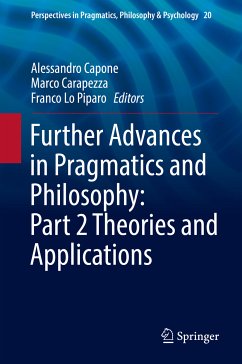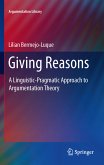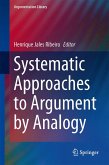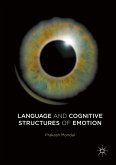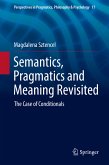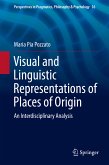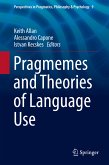Further Advances in Pragmatics and Philosophy: Part 2 Theories and Applications (eBook, PDF)
Redaktion: Capone, Alessandro; Lo Piparo, Franco; Carapezza, Marco


Alle Infos zum eBook verschenken

Further Advances in Pragmatics and Philosophy: Part 2 Theories and Applications (eBook, PDF)
Redaktion: Capone, Alessandro; Lo Piparo, Franco; Carapezza, Marco
- Format: PDF
- Merkliste
- Auf die Merkliste
- Bewerten Bewerten
- Teilen
- Produkt teilen
- Produkterinnerung
- Produkterinnerung

Hier können Sie sich einloggen

Bitte loggen Sie sich zunächst in Ihr Kundenkonto ein oder registrieren Sie sich bei bücher.de, um das eBook-Abo tolino select nutzen zu können.
The two sections of this volume present theoretical developments and practical applicative papers respectively. Theoretical papers cover topics such as intercultural pragmatics, evolutionism, argumentation theory, pragmatics and law, the semantics/pragmatics debate, slurs, and more. The applied papers focus on topics such as pragmatic disorders, mapping places of origin, stance-taking, societal pragmatics, and cultural linguistics.
This is the second volume of invited papers that were presented at the inaugural Pragmasofia conference in Palermo in 2016, and like its predecessor presents…mehr
- Geräte: PC
- ohne Kopierschutz
- eBook Hilfe
- Größe: 7.14MB
![Giving Reasons (eBook, PDF) Giving Reasons (eBook, PDF)]() Lilian Bermejo LuqueGiving Reasons (eBook, PDF)73,95 €
Lilian Bermejo LuqueGiving Reasons (eBook, PDF)73,95 €![Systematic Approaches to Argument by Analogy (eBook, PDF) Systematic Approaches to Argument by Analogy (eBook, PDF)]() Systematic Approaches to Argument by Analogy (eBook, PDF)73,95 €
Systematic Approaches to Argument by Analogy (eBook, PDF)73,95 €![Language and Cognitive Structures of Emotion (eBook, PDF) Language and Cognitive Structures of Emotion (eBook, PDF)]() Prakash MondalLanguage and Cognitive Structures of Emotion (eBook, PDF)40,95 €
Prakash MondalLanguage and Cognitive Structures of Emotion (eBook, PDF)40,95 €![Semantics, Pragmatics and Meaning Revisited (eBook, PDF) Semantics, Pragmatics and Meaning Revisited (eBook, PDF)]() Magdalena SztencelSemantics, Pragmatics and Meaning Revisited (eBook, PDF)73,95 €
Magdalena SztencelSemantics, Pragmatics and Meaning Revisited (eBook, PDF)73,95 €![Argumentation and Language - Linguistic, Cognitive and Discursive Explorations (eBook, PDF) Argumentation and Language - Linguistic, Cognitive and Discursive Explorations (eBook, PDF)]() Argumentation and Language - Linguistic, Cognitive and Discursive Explorations (eBook, PDF)73,95 €
Argumentation and Language - Linguistic, Cognitive and Discursive Explorations (eBook, PDF)73,95 €![Visual and Linguistic Representations of Places of Origin (eBook, PDF) Visual and Linguistic Representations of Places of Origin (eBook, PDF)]() Maria Pia PozzatoVisual and Linguistic Representations of Places of Origin (eBook, PDF)73,95 €
Maria Pia PozzatoVisual and Linguistic Representations of Places of Origin (eBook, PDF)73,95 €![Pragmemes and Theories of Language Use (eBook, PDF) Pragmemes and Theories of Language Use (eBook, PDF)]() Pragmemes and Theories of Language Use (eBook, PDF)129,95 €
Pragmemes and Theories of Language Use (eBook, PDF)129,95 €-
-
-
This is the second volume of invited papers that were presented at the inaugural Pragmasofia conference in Palermo in 2016, and like its predecessor presents papers by well-known philosophers, linguists, and a semiotician. The papers present a wide variety of perspectives independent from any one school of thought.
Dieser Download kann aus rechtlichen Gründen nur mit Rechnungsadresse in A, B, BG, CY, CZ, D, DK, EW, E, FIN, F, GR, HR, H, IRL, I, LT, L, LR, M, NL, PL, P, R, S, SLO, SK ausgeliefert werden.
- Produktdetails
- Verlag: Springer International Publishing
- Seitenzahl: 594
- Erscheinungstermin: 13. Februar 2019
- Englisch
- ISBN-13: 9783030009731
- Artikelnr.: 55205319
- Verlag: Springer International Publishing
- Seitenzahl: 594
- Erscheinungstermin: 13. Februar 2019
- Englisch
- ISBN-13: 9783030009731
- Artikelnr.: 55205319
- Herstellerkennzeichnung Die Herstellerinformationen sind derzeit nicht verfügbar.
